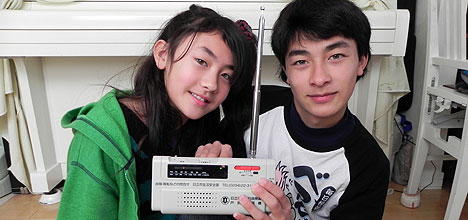A specially made Civil Defence radio being used by a Bay man now living in Tauranga's sister city, Hitachi, is a possible solution to Tauranga's tsunami warning woes.
Phillip Knight and family have used the radio since the earthquake and tsunami struck Japan on March 11.
Toni de Rijk's niece and nephew Reina and Hiromu Knight in Tauranga's sister city Hitachi with their civil defence radio.
Phillip is the brother of Tauranga triathlete Toni de Rijk. Toni and her husband Paul are well known in the Tauranga multisport community.
Phillip's radio has three settings: AM, FM and Emergency only. The emergency broadcasts interrupt any radio programmes being listened to, regardless of how it's tuned.
Types of emergency broadcasts include: tsunami warnings, earthquake warnings and follow-ups, locations of evacuation areas, delivery points and times for water, updates on water and electricity reconnections, updates of radiation levels in the air and water, revised school schedules and revised rubbish pick-up schedules.
'When we aren't having quite the level of drama we are having now, it has also broadcast missing or found person reports,” says Phillip.
'I very strongly recommend incredibly loud and annoying sirens for low-lying coastal areas as well and signs easily identifying evacuation areas.
'They are very clearly marked here on all main roads and arterial routes.”
The dedicated Civil Defence radio is among tsunami warning systems which may be looked at by the Tauranga City Council.
The council decided against tsunami warning sirens on January 26, opting instead to invest in Readynet – a package deal which includes warnings delivered by radio and television announcements, community contact systems using texting and emails, mobile public address loudspeakers and door-to-door warnings.
Readynet will cost the city $16,000 a year, which is a ‘negotiated' price for members of the Bay of Plenty Civil Defence Emergency Management Group.
The council is also agreeing to buy 1900 power line messaging units at $120 each. The $228,000 is to be paid over two years.
The council is having its own look at tsunami warning systems because of a slow response from regional civil defence, which had been advising council.
'I know full well they have been so busy with Christchurch matters,” says mayor Stuart Crosby.
'There is enough concern both in council and out in the community with a lack of progress, so we need to put in our own resource to speed things up.”
The councillors have to make a decision in May as part of the Annual Plan process.
For councillor Bill Grainger, it provides another chance to push the argument for tsunami warning sirens.



0 comments
Leave a Comment
You must be logged in to make a comment.